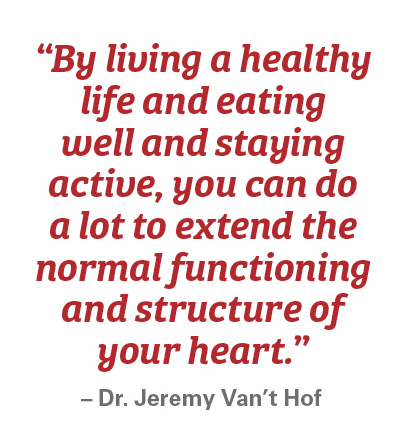
Compared with many parts of our bodies that undergo obvious changes as we age—skin develops wrinkles, bones lose density, for example—the heart is incredibly resilient.
Most of the significant health changes seen in our hearts as we age have to do with how we treat them throughout our lives, says Dr. Jeremy Van’t Hof, assistant professor of medicine in preventive cardiology at the University of Minnesota. Though the muscle and blood vessels might stiffen over time, a healthy older heart is much the same as a younger one. “By living a healthy life and eating well and staying active, you can do a lot to extend the normal functioning and structure of your heart,” Van’t Hof says.
 Heart disease—a term encompassing a range of conditions from coronary artery disease to heart attack to abnormal heart rhythm and others—is the leading cause of death for all men and women in the U.S., according to the Centers for Disease Control and Prevention. Though family history can play a role in heart conditions, Van’t Hof says, heart disease is far from inevitable. Even in our older years, it’s possible to improve heart health. He offers a few recommendations:
Heart disease—a term encompassing a range of conditions from coronary artery disease to heart attack to abnormal heart rhythm and others—is the leading cause of death for all men and women in the U.S., according to the Centers for Disease Control and Prevention. Though family history can play a role in heart conditions, Van’t Hof says, heart disease is far from inevitable. Even in our older years, it’s possible to improve heart health. He offers a few recommendations:
CHECK YOUR CHOLESTEROL AND BLOOD PRESSURE REGULARLY
Cholesterol should be checked every four to six years, or more often if you have a family history of high cholesterol or have been diagnosed with high cholesterol. Blood pressure should be checked at least once every two years, or more frequently if you’ve been diagnosed with high blood pressure.
MAINTAIN A HEALTHY DIET
Avoid processed foods and be mindful of portions (learn more at choosemyplate.gov). A Mediterranean diet rich in leafy greens, fruits, nuts, whole grains, and healthy proteins, such as fish, is excellent for heart health.
STAY ACTIVE
The American Heart Association recommends 150 minutes of moderate intensity exercise a week, which is commonly broken down into 30 minutes a day, five days a week. That’s a good goal, but any activity is better than nothing, Van’t Hof says. If 30 minutes a day is too much now, start smaller and work your way up.
AVOID LIFESTYLE RISKS
Smoking increases the risk of heart disease significantly. If you need extra support quitting tobacco, Blue Cross offers a program to help. Call 1-888-662-BLUE (2583) for more information. Also, avoid heavy alcohol use, as it can put you at increased heart disease risk.


